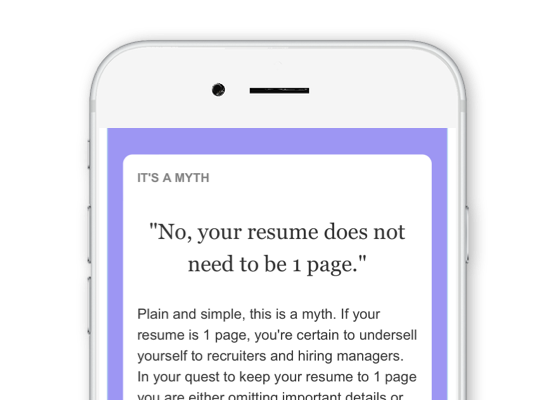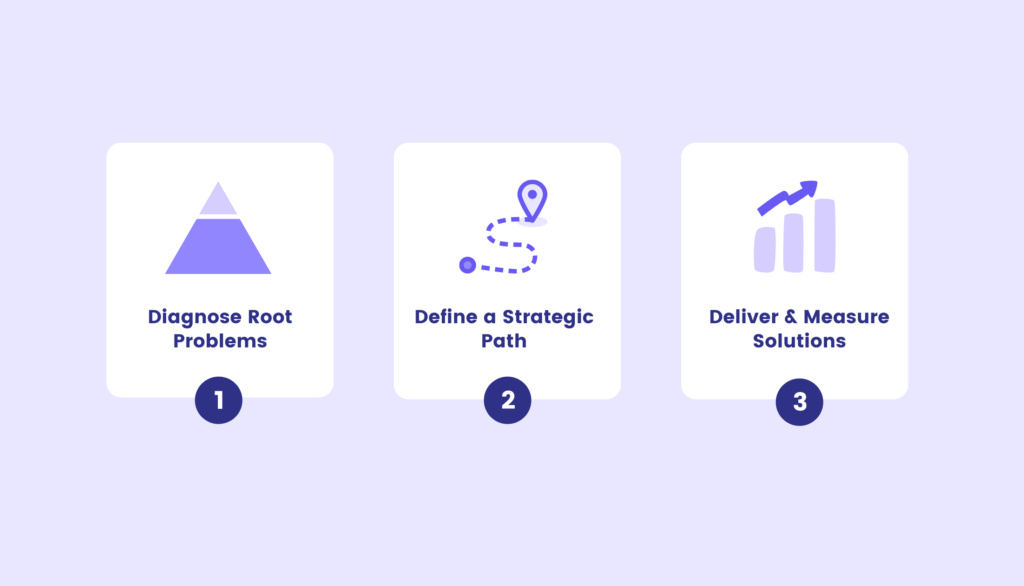Episode 67
How to deal with ghosting in your job search
15 min listen
Episode 54
15 min listen

Listen to the Episode
Episode Summary
How do you cope with ghosting in the job search? This episode offers real insights and practical advice for understanding and managing the impact of ghosting in the hiring process. Through a relatable story and expert guidance, listeners gain valuable strategies for reducing the chances of being ghosted and reframing their perceptions around recruiters and hiring managers.
The episode encourages individuals not to take ghosting personally and emphasizes the importance of taking proactive steps, such as following up with potential employers to gain clarity. Additionally, it highlights the significance of reaching out for updates and controlling one’s thoughts to navigate the emotional impact of ghosting.
By providing insights and strategies for minimizing the chances of being ghosted and adopting a more understanding view of recruiters and hiring managers, the episode aims to empower and support individuals in their pursuit of employment opportunities. Tune in to learn how to take control of the job search experience and tackle the challenges of ghosting with confidence.
Create your dream career, and life
- Book a free Career Strategy Call to learn how we can help you
- Get our free Career Roadmap to help you navigate your career
- Check out Career Strategy Lab, our 3-month career coaching program
Discussion Questions About The Episode
- Can you recall a time when you felt ghosted in the job search or interview process? How did it make you feel, and how did you initially respond to the situation? What insights does this episode offer that could help reframe your experience?
- What are some of the reasons why ghosting might occur in the job search process, as discussed in the episode? How might understanding these reasons change the way you perceive being ghosted by a potential employer or recruiter?
- Consider the concept of control and reframing problems discussed in the episode. How can you apply this approach to other areas of your career strategy and life in general? Can you think of situations where focusing on what is within your control could lead to a more proactive and positive mindset?
- Reflect on your own experiences with negative thoughts related to the job search, such as self-doubt, blame, or assigning inadequacy to yourself. How can the perspective on taking control of your thoughts and actions help you navigate these challenges in a more constructive manner?
Episode Notes & Links
For tips on how to craft compelling follow up messages, listen to episode 52 of the podcast.
Learn how commenting and posting on LinkedIn can increase your visibility and chances of getting an interview.
Episode Transcript
Sarah Doody [00:00:00]: Welcome back, friends, to another episode of career strategy podcast. I am so excited you’re here with us. And today, we have a very controversial, let’s say, topic, and that is how to deal with ghosting in the job search. Why does it happen? Why are companies seemingly letting things fall through the cracks, and why can’t they do better? That is what I hear a lot of times on social media, especially from candidates. And so I hope today’s episode helps you realize some of the context behind being in the shoes of the people doing the hiring and how, number 1, ghosting can happen in the 1st place. Number 2, the reality that it’s not necessarily intentional, and number 3, what you can do to maybe minimize being ghosted in the 1st place. I wanna start today’s episode with a story because a couple of weeks ago, I was having breakfast in one of my favorite breakfast spots, and they were doing job interviews for people to work at the restaurant. So I was just sitting there kinda listening.
Sarah Doody [00:01:14]: It was hard not to. And after a couple of candidates came through, the who I the guy that I think was the restaurant manager made this comment to one of his colleagues that they had recently hired someone. And I think this happened, like, on a Thursday or a Friday. And then the person’s 1st shift was supposed to be on a Monday. And guess what? The person never showed up. And when the restaurant manager kept reaching out to them, the person ghosted. And so I share this story because there’s a lot of talk about ghosting as in candidates being ghosted. But at the same time, candidates are ghosting companies.
Sarah Doody [00:02:00]: And the restaurant manager went on to kind of vent to this colleague of theirs about how this happens a lot more than people realize because their colleague was saying no. Like, are you serious? Someone didn’t show up for their 1st shift? And he said, yeah. Like, this is not the 1st time this has happened. And it’s just so fascinating to me because there is such a focus on candidates kinda complaining and being frustrated that they are being ghosted, but it also is happening on the other side of the situation. So today, we are going to focus on candidates being ghosted in the job search and interview process. Maybe another time, we’ll do an episode about companies being ghosted by candidates even after they’re hired, which seriously blows my mind. Alright. So one of the things I think we have to talk about when it comes to ghosting is a lot of people take ghosting seriously, personally, and they feel like they are the only person that this is happening to.
Sarah Doody [00:03:07]: Cool. And so if this has happened to you recently, I want you to know you are not the only one. Don’t take it personally. This is partially a function of how many candidates recruiters and hiring managers are trying to manage and deal with. And let’s think about some things that you could do to maybe reduce the chances that you’re even ghosted in the 1st place. So often I log in to LinkedIn and see people complaining and about recruiters and hiring managers and how they’re ghosted and kind of shaming them and telling them that they should do better and and all this stuff. And it’s like, hold on. Let’s look at what life is like in their shoes.
Sarah Doody [00:03:49]: Now in no way am I trying to normalize ghosting or say it’s okay, but I think a label of ghosting, it implies that it’s intentional, and I don’t think that’s normally the case. So imagine you are hiring for a position. It’s highly possible you could have a 100, 200 applicants, possibly more. That is a lot of people to manage and to be in contact with. And there’s kinda degrees of ghosting. Right? Because some people would say ghosting is receiving a kind of automated rejection and that that is ghosting and it’s not okay and that companies should provide you with a multiparagraph personalized response as to why you didn’t make it to the screener interview. Now if we look at this from a numbers situation, how would 1 recruiter or hiring manager find the time to write, let’s say, 80 messages to the 80 out of 100 people that probably didn’t make it to the screening round. Right? That’s a lot of messages to write individually.
Sarah Doody [00:05:11]: That’s multiple days of their time. And so I think we need to remember that that is not intentional. That is just a function of how many hours are in a day and that it is not, I think, humanly possible for people to do their jobs and provide that level of feedback. So that’s one place where people, especially candidates, say ghosting is happening, but I don’t think ghosting is really the right word there. However, the further you get in the job interview process. Let’s think about where else ghosting could happen. So let’s say you apply for a job, you make it through a couple of rounds in of interviews and you feel like things went well after, say, the 2nd interview, and then you hear nothing. And it’s been 2 weeks.
Sarah Doody [00:06:07]: People might say that’s ghosting after 2 weeks. But here’s the thing. There are things within your control that you can do to try and keep that relationship or conversation going. Right? So whenever people tell me they’ve been ghosted, one of the first questions I say to them is, Doody you follow-up? Did you reach out? Did you send a message and ask what the status of the role is? What their timeline to hire someone is? Because if you don’t have that information, then you don’t have the all of the context. Right? And you’ll hear me talk about context quite a bit, but it is so important to understanding the whole nature of a situation. And without context, we end up kind of inventing reasons for why things happened. And a lot of times, especially in the job search, one of those reasons is I am not good enough. I must have failed.
Sarah Doody [00:07:08]: I must have not been what they are looking for, etcetera. And we assign blame or inadequacy to our when in reality, it could be that that person was on vacation. They had a family Experience, and no one is covering their inbox. They had another role that got prioritized by their boss so they are more focused on the other role and not the role that you applied to. That’s what I mean by context. But if you don’t ask the questions, then you won’t have the context. So if you are in a situation where you feel like you’ve been ghosted. I want you to think to yourself, wait a sec.
Sarah Doody [00:07:54]: Do I have all the information? And is there anything I could potentially do to gather the right information? Right? Follow-up, reach out, get answers so you don’t end up kinda self sabotaging and believing that you were the reason or that the ghosting is, in essence, a rejection. Right? One thing I wanna remind you of too when it comes to follow ups is I think a lot of people are nervous to follow-up or not sure what to say or worried that it’ll make them seem desperate or overly eager or something like that. And in reality, I don’t believe that’s the case. I think a follow-up that could easily be 1 or 2 sentences at most is a legitimate thing that you can do gather the information you need. Like I said, there are many reasons why someone maybe didn’t get back to you, but you won’t know unless you ask them. So consider sending a short to the point follow-up. People do not get replies to their follow ups for a couple of reasons. Number 1, the follow-up is far too long.
Sarah Doody [00:09:09]: I often see people write follow ups that are trying to provide more information about themselves, tell, like, their life story or something. And it’s like, this is not the time to do that because here’s what happens. If you put too much stuff in a follow-up, then the 1 question you want them to answer, which is, what is the time line for hiring. Am I still in the running for this position or however you wanna phrase it? If you surround that with a lot of other information. That question can easily get lost. So it’s much more effective to just send a 1 or 2 sentence email that asks about the status of the role, the timing of hiring, when you can expect to hear from them next, and keep it short. That way, you’re gonna increase the chances that someone replies. Because far easier for someone to just reply with a 1 sentence back to you to answer that question versus think to themselves, oh my gosh.
Sarah Doody [00:10:10]: That’s a gigantic email. I’m gonna put that aside and reply to it later. So I wanna recap our ghosting in the job search. Number 1, ghosting happens to many people. You are not the only person that’s being ghosted. Number 2, ghosting is not intentional. I don’t think recruiters and hiring managers are sitting there intentionally not replying to you. I think there are reasons such as workload, prioritization of roles they’re recruiting for and many other things that could result in them not getting back to you as quickly as you wish they would get back to you.
Sarah Doody [00:10:53]: Number 3, we have to make sure that you have the context you need. And if you want the context, you have to follow-up. So if you’re not following up, it is going to be worth it to invest the time to write 1 or 2 sentence emails to just ask for an update, get a timeline, keep it short and sweet so you don’t end up kind of festering in doubt and worry and things like that in all these hypotheticals. So there we have it. Ghosting in the job search. I want you to start doing follow ups and to not take it so personally and to remember the situation, the context of the jobs that the recruiters and hiring managers have to Doody. Because, sure, they don’t get it they don’t get things right all the time, but I don’t think we can place all of the blame on them. I think most people are doing the best they can.
Sarah Doody [00:11:51]: And if we proactively follow-up, we might get the answers we are looking for. Alright. And the other thing I wanna remind you is in episode 52, we talked about some of the things we talked about today. Mainly, if you are stuck in a situation, it’s really helpful to look at the variables that are in your control and not within your control. And when it comes to ghosting in the job search, right, we can’t control whether or not people reply to us. We can’t control how many other applicants the recruiter is dealing with. But what can we control? Whether or not we reach out for follow-up. Right? We can control if we send that email or not.
Sarah Doody [00:12:34]: We can control our thoughts. And if we are kinda catastrophizing and inventing reasons for why they didn’t get back to us. And as we said earlier, assigning blame on ourselves as though I was not the ideal candidate. I must not have met the mark. I wasn’t what they were looking for, etcetera, etcetera, etcetera. And instead, catching ourselves and realizing, actually, that’s not within my control, but what is within my control are these 3 things over here. So if you wanna listen to that episode 52, it’s very mindset oriented around kinda dealing with negative thoughts and imposter syndrome and tricky situations, then definitely check that out because it will help you reframe problems and realize when you think things are not within your control, there are probably a few things that are actually within your control. It’s just that you’re so focused on the things that are not within your control that you can’t really see the things that you could probably take action on, such as with ghosting.
Sarah Doody [00:13:45]: Right? It’s so easy to just place blame on the recruiters and hiring managers. Right? We see this on social media. People just talking trash about recruiters and hiring managers, but it’s like, wait a second. We don’t know their story. We don’t know their situation. And did you ask? So hopefully, this reframes ghosting in the job search for you, and I on another episode. Thanks for listening to the career strategy podcast. Make sure to follow me, Sarah Doody, on Twitter, Instagram, YouTube, or LinkedIn.
Sarah Doody [00:14:21]: If anything in today’s episode resonated with you, I’d love to hear about it. Tag me on social media or send me a DM. And lastly, if you found this episode helpful, I’d really appreciate it if you could share it with a friend or give us a quick rating on Spotify or review on Apple Podcasts.













